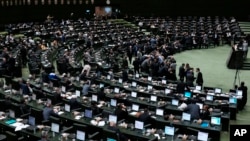The Iranian government has withdrawn controversial legislation meant to counter fake news after critics charged that it would gut the already restricted freedom of expression in Iran.
Government spokeswoman Fatemeh Mohajerani announced the decision on July 30, writing on X that the administration of reformist President Masud Pezeshkian opted to withdraw the bill “to maintain national unity.”
Drafted by the government and the hardline judiciary, the 22-article bill was submitted to parliament last week, where lawmakers voted 205-49 to fast-track its review. There were three abstentions.
The legislation, which critics have labeled the “bill of suffocation,” has stirred up intense debate among politicians and civil society groups. Critics warn that vague phrases like “disturbing public opinion” and “content against state security” could be used as a pretext for sweeping, arbitrary crackdowns on press freedom and legitimate dissent.
Supporters of the bill, including many in the government and ultraconservatives, argue that the bill is vital for keeping the public safe and maintaining order, especially in light of how quickly misinformation spreads online.
They claim the proposed measures are necessary to protect national security and preserve social stability.
If the bill were to become law, those who publish "fake news" could face prison sentences of up to 15 years -- a punishment that, according to legal experts, is in some cases harsher than the penalties for more serious offenses such as espionage or kidnapping.
Iran regularly ranks near the bottom on global press freedom indexes, with Reporters Without Borders (RSF) calling it “one of the world’s most repressive countries in terms of press freedom” in its latest annual report.
According to RSF, 21 journalists are currently behind bars in Iran.









